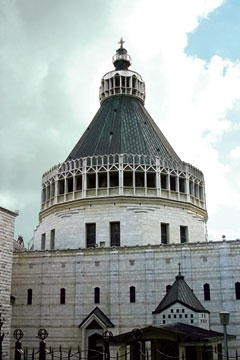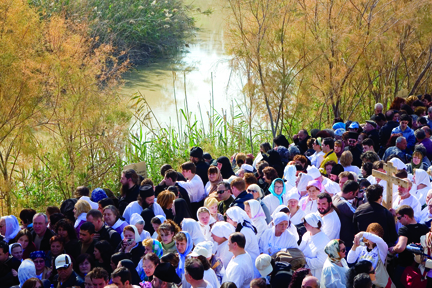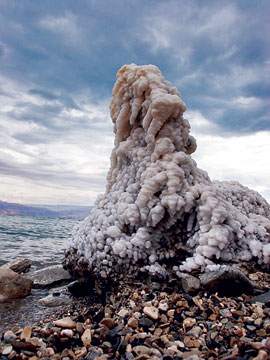
With special attention to the nuances of sacred sites, visitors to Israel will experience the intersection of history, geography and archeology.
By Eva Marie Everson and Miriam Feinberg Vamosh
As far back as I can remember, I have wanted to visit the Holy Land. Then in 2002, I received a call from Israel’s Ministry of Tourism, inviting me, a Christian journalist, to visit Israel on a 10-day press tour. Though initially pessimistic, I accepted the offer and became more and more elated as the day of departure drew near.
 Friends who had been before said, “You’ll never be the same.” Or, “Once is never enough.” I knew I’d never be the same, but I was fairly certain once would be enough.
Friends who had been before said, “You’ll never be the same.” Or, “Once is never enough.” I knew I’d never be the same, but I was fairly certain once would be enough.
I was wrong.
In 2002, tourism was down. Church groups and individual travelers were cancelling reservations and putting their plans on hold. But when I returned in 2007, I found the land overflowing with tourists. Some were biblical students who wanted to understand better what they would one day teach others. Most were pilgrims who sought to see the land of the Bible. Some traveled with tours; others traveled alone or within an intimate group. But none of us leave by the same door we entered; Israel changes its pilgrims.
Scripture-for-life lessons
For both individuals and groups, the Bible comes alive in Israel like nowhere else. This is especially true in a group led by a pastor and a guide. The trained guide focuses peoples’ attention on the special nuances of each site, and explains the intersection of history, geography and archaeology, enabling individuals to take Scripture-for-life lessons away with them from the very landscape Jesus and all the biblical characters knew.
Touring Israel with a group also allows a feeling of community and the ability to grow spiritually and intellectually together. Being in a group allows for getting to know people on a different level than before.
If you choose to come on your own, you’ll also grow in your love of Scripture while discovering the sights in your own way and at your own pace. That could mean spending a half-day sitting on Mount Tabor or Mount Gilboa, letting the landscape flow across your field of vision for as long as you want. Individual travelers are free to hire a private guide who will help with planning but still allow for personal space and scheduli ng.
ng.
Only in israel
Only in Israel can you scan the landscape in Megiddo and view the location where many of the stories of the Bible took place.
Only in Israel can you walk into the depths of the desert, Ein Avdat, and be reminded of the spiritual desert you once walked and how God brought you out of it.
Only in Israel can you hike up the back of a mountain then peer over its rocky ledge to see the path Jesus would have taken from Nazareth to the Sea of Galilee. From this bird’s eye view, you can spot the seaport of Magdala where Mary Magdalene lived, the Mount of Beatitudes, Tabgha where tradition says Jesus multiplied the loaves and fish and Capernaum, the fishing village where Jesus and five of his disciples called home.
Only in Israel can you take a boat ride across the Sea of Galilee, or walk inside the Western Wall Tunnel and see the amazing dimensions of the largest building project in the Western world.
The result is a new knowledge that stems from understanding the spiritual truths behind the stories Jesus told.
 Where faith and hearts unite
Where faith and hearts unite
For many Christians, coming to Israel means interacting with Jews for the first time. The Israel trip is a chance to get to know contemporary Jews, learn about Jewish history and consider the places, even the painful ones, where Jewish and Christian history intersect.
Israel allows its Christian visitors the opportunity to better understand the root of their faith in Judaism. Here, prophecy is fulfilled as Jews and Christians intermingle and Christians are embraced in the most precious kind of welcome. In Israel, Christians have a better opportunity to understand that Jewish history, persisting and flourishing against all odds, is part of God’s plan. In Israel, both Christians and Jews are encouraged to leave behind the baggage that has hampered dialogue for generations and accept one another with God’s love.
Eva Marie Everson is an author and national speaker and Miriam Feinberg Vamosh is a Holy Land expert specializing in Christian heritage. They are the authors of Reflections of God’s Holy Land; A Personal Journey Through Israel (Thomas Nelson, 2008). Photos courtesy of Thomas Nelson.

